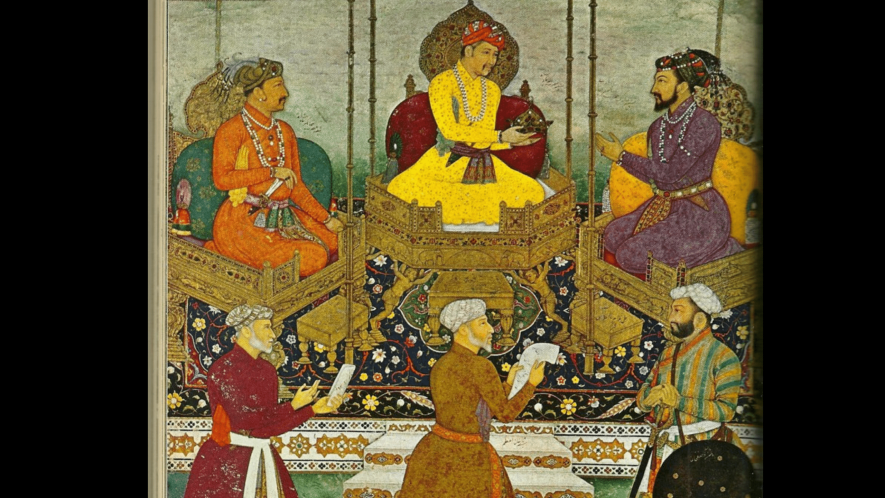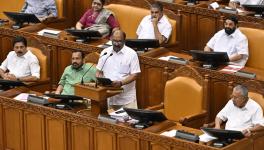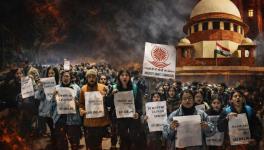Mystery of the Missing Mughals

Image Courtesy: Wikimedia Commons
Of late, NCERT (National Council of Educational Research and Training) has been accused of erasing the Mughal Empire from the official history textbooks that students enrolled in high schools affiliated to the Central Board of Secondary Education (CBSE) are recommended to read.
Ever since it was established in 1961, and especially after education as a subject for legislation was moved from the State List to the Concurrent List (i.e., it came under the joint jurisdiction of both the Union and the state governments) in 1976, NCERT has come to wield disproportionate influence in matters relating to school education — both curricular and pedagogical.
What was conceived of as an educational policy-making body to begin with, is now popularly recognised for its decisive role in drafting and revising school syllabi and textbooks in India. Its every move comes under intense media scrutiny and quickly becomes a matter of public interest.
It was no surprise, therefore, when NCERT announced that it was dropping a theme (nine) titled ‘Kings and Chronicles: The Mughal Courts’ from both the textbook (‘Themes in Indian History Part II’) and the History syllabus for high school (Class XII to be precise) students, that it polarised mass opinion and drew significant attention.
Given the predilection of the previous Bharatiya Janata Party-led Union and state governments to unduly interfere in matters of school curriculum for purposes of indoctrination (a process that had previously resulted in the production of ‘saffronised and substandard’ textbooks under the first National Democratic Alliance government in 1998), the move touched a raw nerve among many well-meaning citizens. They became aghast at the same thing that the pro-BJP elements started celebrating on social media: the supposed excision of Mughal history from an NCERT textbook.
The recent NCERT move that has generated much media furore and click-baiting, however, takes our gaze away from two more important things. The purported erasure of Mughal history from the school history curriculum distracts us from noticing the other rubrics across disciplines and textbooks that have been removed, and from asking questions about the need for the very act of removal itself.
Let us address the latter aspect first. When confronted about the issue of erasing Mughal history from the syllabus, NCERT Director Dinesh Prasad Saklani responded by asserting that out of the two chapters on the Mughals, one has been dropped for the sake of ‘rationalisation’ — that is to avoid significant ‘overlaps’ in course content. He further stated that between the two existing chapters dealing with Mughal history in the textbook concerned, the former that dealt with Mughal policies has been retained, while the latter that contained ‘names and dates’ of the Mughal emperors has been done away with. Per him, this rationalisation, had initially been attempted to provide relief to the students by reducing their workload in the academic years impacted by COVID-19.
The changed syllabus and the altered textbook, however, are here to stay, being fully compliant with the new National Education Policy’s (NEP 2020) professed goal of reducing ‘unnecessary’ course load. Saklani is partially correct, but his reasoning is wrong.
It is true that the Mughal Empire has not disappeared from the rationalised textbook altogether: theme eight titled ‘Peasants, Zamindars and the State: Agrarian Society and the Mughal Empire’ has indeed been retained. However, it does not deal with state policy alone and boasts an info-box toward the end enumerating the ‘names and dates’ of the Mughal Emperors — something that the dropped chapter was alleged to contain and that was insincerely stated to be a reason for its eventual removal.
Rationalisation of an already impoverished history syllabus for high school students is but another sleight of hand for diluting the quality of pre-college education in India.
However, if the NCERT chairman's rhetoric is to be taken at face value, that is, hypothetically, if one is charged with the ‘unavoidable’ responsibility of deleting one chapter from the NCERT textbook causing the least disruption, it is understandable why the sword might fall on chapter five (theme nine) and not the others.
The first two chapters are broad surveys into encountering difference through foreign perceptions and understanding the development of syncretic traditions in the subcontinent. These are concerned with the histories of connections and confluence. The third chapter seeks to understand a specific site of urbanisation in South India through the approach of architectural history and political culture. The fourth chapter — the one on Mughals that has been retained so far — is an investigation into good old social and economic history.
The last chapter — one that has now been dropped, does overlap chronologically with the fourth (both having the temporal range of 16th-17th centuries) and is methodologically a bit wishy-washy: its subject-matter being top-down imperial narrativisation with a dash of cultural history thrown in. It is probably decent as a stand-alone rubric but best complements the more solid previous chapter.
It is important to note here that the textbook series (there are three parts in total) does not have anything specifically on the Delhi Sultanate and that it skips over the early-medieval period of Indian history altogether. The parts are also particularly wanting as far as material on Eastern and North-Eastern India is concerned. Diluting its content further is not a good idea to begin with. However, if it must happen, it is explicable why any sound historian would rather do away with the last chapter than any of the other four.
It is not correct for anybody to claim (on either side of the debate) that Mughal history has been excised from the NCERT syllabus. It is there: unless by Mughal History one means court rituals only and not the land revenue system.
The moot question, nonetheless, is not why this chapter was dropped and not any other — the decision could or could not have been ideologically motivated. The way the NCERT works now, it is probably not too far-fetched to assume that the decision-makers did not even bother to reason further after pointing out that two out of five rubrics had the keyword ‘Mughal’ and hence one of them could be dropped on the pretext of weeding out ‘overlaps’ (thematically the two could not have been more different) without any second thought.
The more important question seems to be this: what purpose does the NEP objective of wanton ‘rationalisation’ serve anyway? Why must NCERT ‘rationalise’ the syllabi at all? The catchy term itself has been lifted from the vocabulary of neoliberal consultancy and corporate management: reducing redundancies through ‘rationalisation’ being a euphemism for unjustified terminations. In the context of Indian education policy, it appears to be a veil for systematic dilution and defunding — in other words, withdrawing the ‘public’ from the public education system, by hook or by crook.
Conventional undergraduate degrees are already undergoing the process of being converted into Four-Year Undergraduate Programmes (FYUPs). In Delhi University, the NEP-induced FYUP is making students earn 160 credits over eight semesters (four years), three of which they will now be spending to cover undifferentiated and non-specialised courses. Earlier, students could earn 148 credits in three-year honours programmes. The FYUP has brought down the emphasis on the core courses from 75% to 50%.
The average Indian public-university student will no longer be able to obtain rigorous education in a single discipline but will effectively graduate with a diluted degree in four years. The real policy problem, whether for school education or higher education, is this dilution itself. What exactly is being sacrificed in the process is a pedagogical concern.
The NEP’s mindless pursuit of rationalisation is also evident in its articles 5.10 and 7.6, where it ‘strongly endorses the idea of the school complex/cluster, wherever possible’. In other words, the NEP wishes to do away with the problem of unfeasibly small schools not by injecting more public funds to make them well equipped, better staffed, and operationally viable, but by coat-tailing many such schools in a large area to a singular complex/cluster. The NEP is not so concerned with the challenges of increasing accessibility to and the resources of small schools in remote areas as it is with cutting costs by shutting them down altogether.
The same can be said about NCERT when it comes to syllabi and textbook rationalisation. Instead of focusing on how to better deliver high-quality education to school students now that the COVID-19 pandemic is behind us, NCERT is still using it as a pretext to evade the responsibility of finding alternative avenues and mechanisms for enriching the course content and experimenting with assessment methods. This dereliction of duty is then sought to be covered up through hyperactivity in syllabi and textbook rationalisation.
In fact, as we have noted earlier, the whole hullabaloo around the ‘erasure of Mughal history’ has diverted considerable public attention from the fact that NCERT has removed content from textbooks across all levels and disciplines: whole chapters on ‘Understanding Partition’ and ‘Rise of Popular Movements’ have been deleted. Among other themes, rubrics such as ‘Dalit Poetry’ and ‘Democracy and Diversity’ too have faced the axe. In a much more ideologically motivated move, all references to the Gujarat Riots and chunks of explanatory text on Gandhi’s assassination that incriminate the RSS have been expunged too.
It is important to be vigilant about these overt and covert acts of censoring information — turning education into propaganda cannot be allowed. At the same time, it is equally essential to stress that the problem lies in the unquestioned logic of rationalisation itself — whether the exercise is arbitrary or motivated does not change its intended outcome: making education trivial.
As many commentators have pointed out, rationalisation can certainly be part of a wider move toward saffronisation. However, that should not blind us to the fact that the very idea of rationalisation itself heralds ominous implications for the future of an already-crippled public education system in India.
The writer is a Rhodes Scholar from India, studying Global and Imperial History at the University of Oxford. The views are personal.
Get the latest reports & analysis with people's perspective on Protests, movements & deep analytical videos, discussions of the current affairs in your Telegram app. Subscribe to NewsClick's Telegram channel & get Real-Time updates on stories, as they get published on our website.























